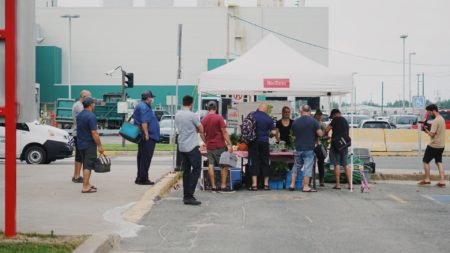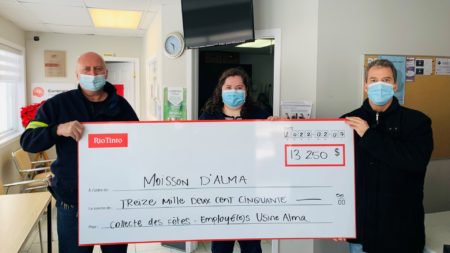Fostering Mutual Aid in the Community

Employees enjoyed fresh vegetables from Jardins Mistouk in summer 2021.
In early 2021, Alma Works entered into a three-year partnership with Jardins Mistouk, a non-profit organisation. The partners have similar environmental and social impact goals and similar values, such as mutual aid, sharing, and community support. In addition to donating $25,000 per year to Jardins Mistouk, Rio Tinto wishes to directly involve its employees, who are members of the community, to help the organisation grow and widen its reach.
During a meeting with the Good Neighbourly Relations Committee, Jérôme Gagnon, Vice President, Jardins Mistouk, along with Patrick Moisan, Administrator, Jardins Mistouk, presented the project that led to the partnership.
Marie-Kim Bouchard, Advisor, Communities and Communications, Alma Works (Rio Tinto), said, “The Rio Tinto-Jardins Mistouk partnership reflects our wish to be involved in the community and our values in terms of environmental responsibility. We want to minimise our impact on the environment and surrounding community, as well as encourage our employees to get involved in their area. So, the partnership stems from shared values, with mutual aid chief among them.”
A three-pronged partnership
To date, the partnership has consisted of three components. The first focuses on selling products at vegetable stands set up every week at Alma Works facilities during the summer season. Rio Tinto pays 65% of the price of the vegetables so employees can get fresh, healthy food for only $1 per unit.
The second component focuses on support for the solidarity garden (Jardin de Solidarité). This programme backed by the Ministère de l’Agriculture, des Pêcheries et de l’Alimentation seeks to make fresh, organic, locally grown vegetables available to everyone. There are seven such gardens in Quebec, including the one run by Jardins Mistouk. A portion of the vegetables grown at this garden are donated to Moisson d’Alma, an organisation that Rio Tinto has been collaborating with for several years.
Ten tonnes of vegetables were donated last year, and Gagnon hopes to increase this number to 16 tonnes, which represents 75% of the production of 2.5 hectares. The goal is to provide the food network with the vegetables that it needs, in the right quantity, and at the right time. This is why Jardins Mistouk collaborates with the local integrated university health and social services centre (CIUSSS du Saguenay–Lac-St-Jean) and Moisson d’Alma, and also partners with the local youth employment centre (Carrefour jeunesse-emploi), which every summer employs young people who are in social reintegration programmes. These youths, called Les Robinculteurs, also run the weekly stands at Alma Works.
The third component focuses on employee participation and awareness of the environment and food waste. Educational videos have been created to help employees understand the impact of their community involvement by adopting environmentally responsible practices.
“Rio Tinto has a wealth of internal human resources that can be very useful,” Gagnon said. “They can contribute their diverse knowledge to innovation, including the design of low-tech machinery to optimise our practices. We may even be able to tap into the world’s greenest aluminium, which Rio Tinto produces. This exchange of services is part of our mission to increase people’s involvement and encourage collective mutual aid.”
A year has passed since the partnership began, and already the table is well set to continue to nurture this collaboration, from which some great initiatives are emerging.


